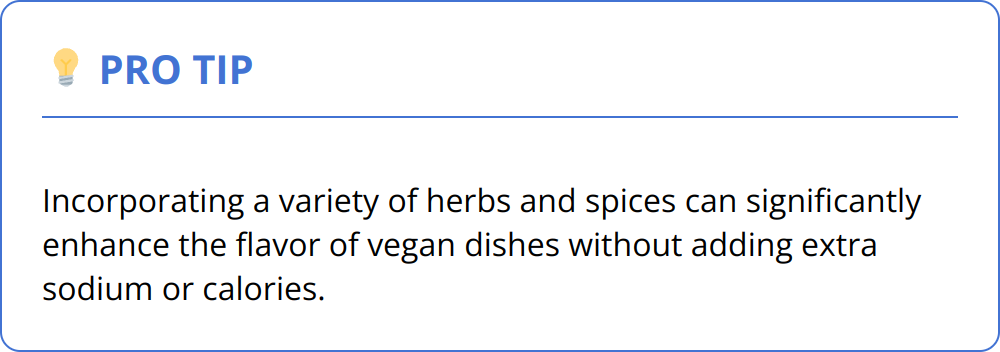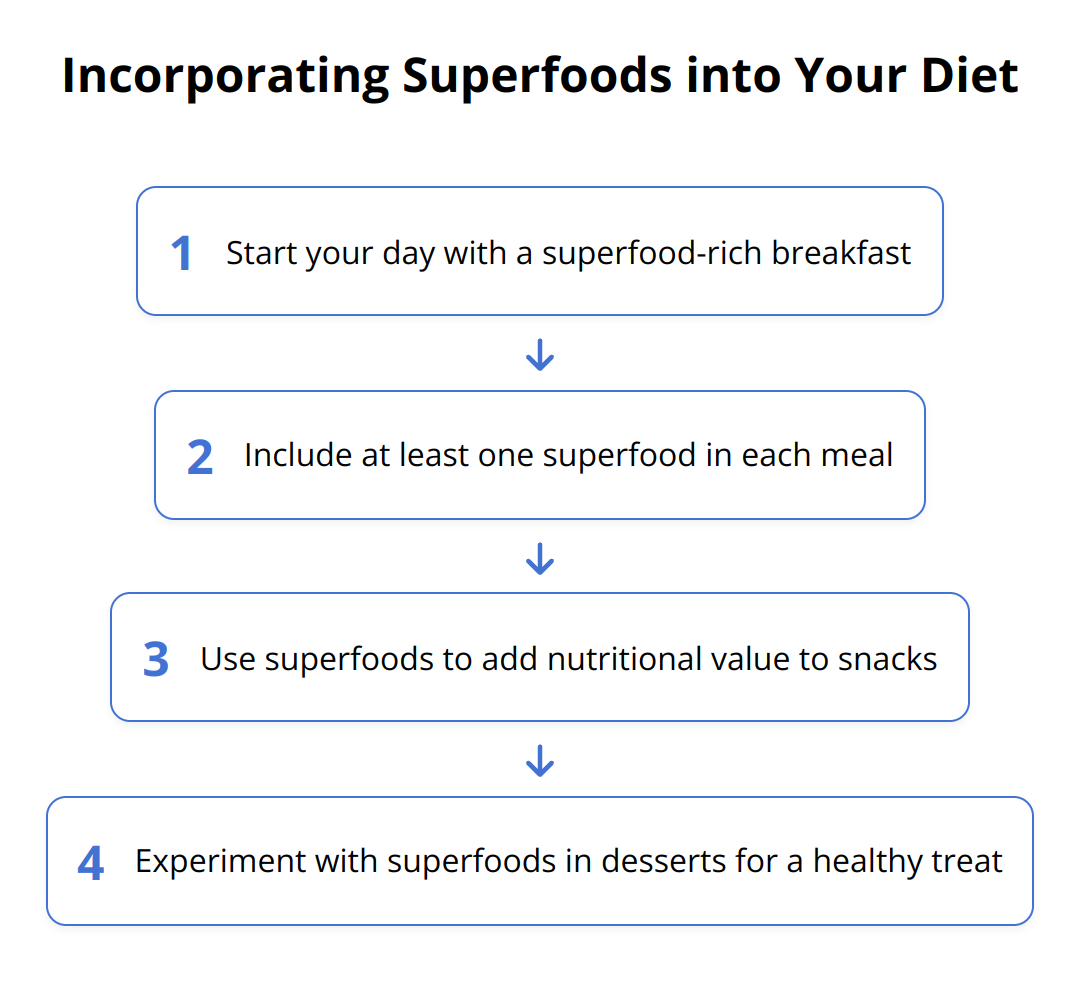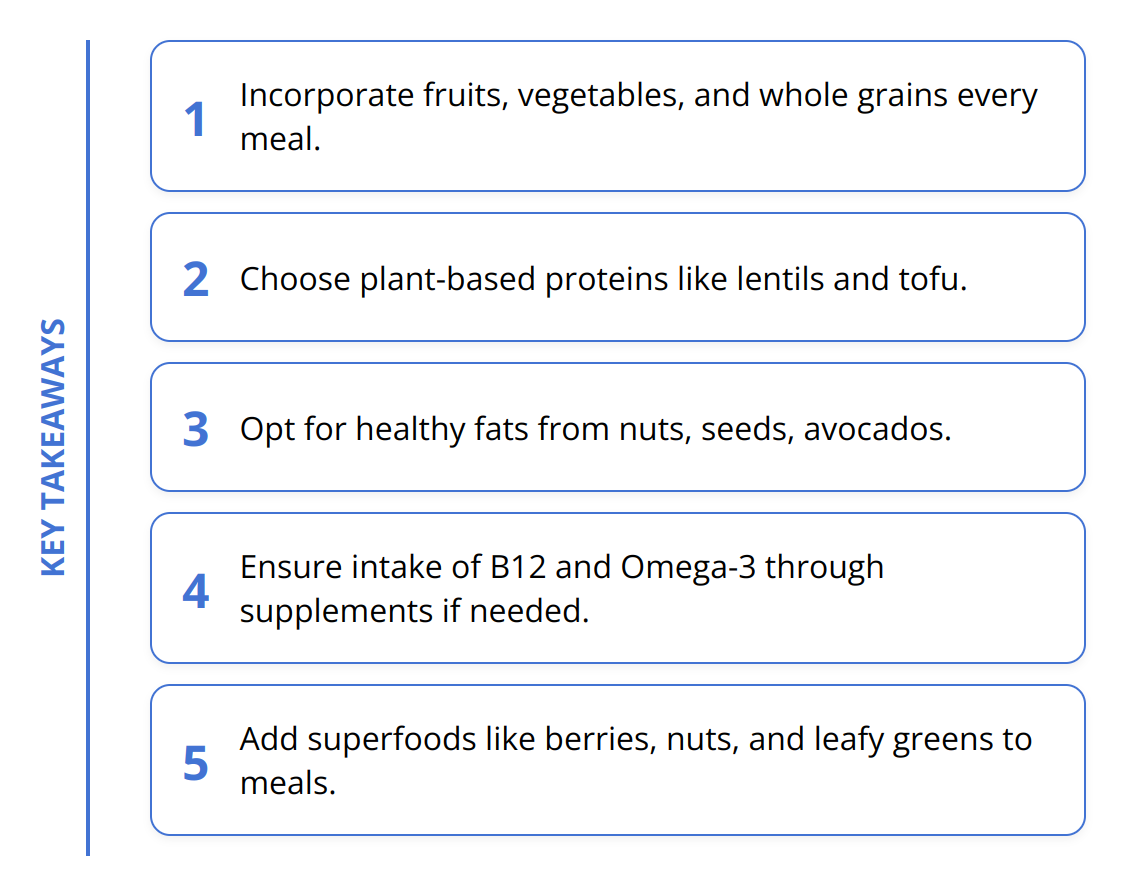Vegan Heart-Healthy Meals: Best Practices

At Healthy Tips You Blog, we’re passionate about the power of diet on heart health, particularly the impact of vegan diets. Research consistently shows that plant-based eating can significantly improve cardiovascular health.
This post will guide you through creating a heart-healthy vegan meal plan, emphasizing key nutrients, meal planning strategies, and incorporating superfoods for optimal health. Let’s explore the best practices for crafting delicious, heart-healthy vegan meals.
Vegan Diets Enhance Heart Health
A plant-based vegan diet is a powerful tool for maintaining and improving heart health. Vegan diets are rich in fibers, antioxidants, and phytonutrients, all of which contribute to a healthy heart by reducing inflammation, lowering blood pressure, and improving blood lipid profiles. Additionally, vegan diets are naturally lower in saturated fats and cholesterol, which are risk factors for heart disease.
The Heart of the Matter: Nutrients and Heart Health
Key nutrients found in vegan diets that promote heart health include omega-3 fatty acids, fiber, antioxidants, and phytochemicals. Sources of these nutrients include flaxseeds, chia seeds, walnuts (for omega-3s), fruits, vegetables, whole grains (for fiber), and a wide variety of plant foods like berries and leafy greens (for antioxidants and phytochemicals). These nutrients work together to reduce inflammation, lower cholesterol levels, and keep the blood vessels healthy, reducing the risk of heart disease.

Convincing Evidence from Research
Several studies underscore the benefits of vegan diets for cardiovascular health. For instance, the Adventist Health Study 2 indicated that vegetarians, including vegans, have a significantly lower risk of heart disease compared to non-vegetarians. The EPIC-Oxford study also found that vegetarians, including vegans, have a lower risk of dying from heart disease. These studies, among others, provide strong evidence that embracing a vegan diet can lead to better heart health and a lower risk of cardiovascular diseases.
Practical Steps to a Heart-Healthy Vegan Diet
- Incorporate a variety of fruits and vegetables into every meal to ensure you’re getting a broad spectrum of nutrients.
- Choose whole grains over refined grains to maximize fiber intake, which helps lower cholesterol and improve heart health.
- Include plant-based protein sources, such as lentils, beans, tofu, and tempeh, in your meals to keep your heart and muscles strong.
- Opt for healthy fats from nuts, seeds, avocados, and olive oil to improve your heart’s health without the harmful effects of saturated fats found in animal products.
- Keep an eye on B12 and Omega-3 intake, as these are crucial for overall health and can be supplemented if not adequately obtained from fortifood sources or supplements.
By focusing on these nutrients and following these practical steps, you can create a vegan meal plan that not only delights your taste buds but also brings profound benefits to your heart. For more detailed guidance on creating balanced vegan meals, explore plant-based protein sources and consider incorporating elements of the Mediterranean diet, known for its heart-healthy attributes, into your vegan lifestyle.
Crafting Heart-Healthy Vegan Meals
Building a heart-healthy vegan meal plan revolves around understanding the nutritional dynamics and ensuring every meal contributes to your overall health, particularly your heart. A balanced vegan diet encompassing all essential nutrients is fundamental for heart health. It requires careful planning and a touch of creativity to keep your meals diverse and enjoyable.
Essential Components and Planning
A heart-healthy vegan meal is more than just fruits and vegetables. It should be a well-thought-out combination of protein, fats, carbohydrates, vitamins, and minerals. Ensuring nutritional completeness involves mixing various food groups to cover the spectrum of required nutrients.
-
Proteins: Key for muscle health and overall metabolism. Include a variety of plant-based proteins like beans, lentils, tofu, and tempeh.
-
Healthy Fats: Crucial for heart health. Focus on sources like avocados, nuts, seeds, and olive oil.
-
Carbohydrates: Opt for whole grains such as quinoa, brown rice, and barley instead of refined grains to boost fiber intake, a vital component for managing cholesterol levels.
-
Vitamins and Minerals: Pay special attention to vitamin B12, vitamin D, and omega-3 fatty acids. While these might be challenging to find in a vegan diet, fortified foods and supplements can fill the gap.
Effective meal planning is pivotal. Start by jotting down a weekly meal plan that incorporates a variety of foods to ensure you’re covering all nutritional bases. Utilize online resources or apps dedicated to vegan meal planning to streamline this process. For inspiration on incorporating variety into your vegan diet, explore detailed guides such as Mediterranean diet benefits.
Tips for Meal Prep and Variety
To keep your vegan meal plan interesting and manageable:
-
Prep in Bulk: Cook large portions of staples like grains and legumes at the start of the week. This will save time and ensure you always have a base ready for meals.
-
Seasonal and Fresh: Opt for seasonal fruits and vegetables. They are not only fresher and tastier but often more affordable and nutrient-dense.

-
Herbs and Spices: Make use of a wide range of herbs and spices to add flavor without extra calories or sodium.
-
Experiment: Regularly introduce new foods or recipes into your rotation to keep meals exciting. Try making vegan versions of your favorite dishes for a heart-healthy twist.

-
Batch Cooking: Allocate time for batch-cooking meals or components of meals. Freezing portions can be a lifesaver on busy days.
By focusing on these practical steps, you’ll not only craft a diet that’s hearty and satisfying but one that fundamentally supports your cardiovascular health. The key is to strike a balance between nutritional needs and the pleasure of eating, making heart health an enjoyable part of your lifestyle rather than a restriction.
Remember, a heart-healthy vegan diet isn’t just about eliminating animal products—it’s about making conscious choices that benefit your heart and overall health every day.
Superfoods for a Vegan Diet
In the quest for optimal heart health through diet, integrating superfoods into your vegan meal plan is a game changer. Superfoods, while not a scientifically defined category, are recognized for their dense nutritional profiles and potent health benefits. They can play a pivotal role in enhancing heart health by providing antioxidants, reducing inflammation, and improving cholesterol levels. Here are standout vegan superfoods that you should consider adding to your diet and practical ways to incorporate them.
Top Vegan Superfoods
-
Berries: A powerhouse of antioxidants.
-
Leafy Greens: High in vitamins, minerals, and fiber.
-
Nuts and Seeds: Rich in omega-3 fatty acids and healthy fats.
-
Legumes: Excellent source of plant-based protein and fiber.
-
Whole Grains: Great for fiber and keeping the heart healthy.
-
Avocado: Loaded with potassium and heart-healthy monounsaturated fats.
-
Quinoa: A complete protein containing all nine essential amino acids.
-
Sweet Potatoes: High in fiber, vitamins, and minerals.
-
Chia Seeds: Exceptionally high in omega-3 fatty acids and fiber.
-
Turmeric: Contains curcumin, a potent anti-inflammatory compound.
Integrating Superfoods into Meals
Creative Breakfast Options
Start your day with a berry and spinach smoothie or chia pudding topped with mixed berries. For those who prefer savory breakfasts, a tofu scramble with turmeric and avocado on whole grain toast is a nutritious choice.
Lunchtime Solutions
Salads are a perfect canvas for superfoods. Combine mixed greens, quinoa, chickpeas, seeds, and a handful of your favorite berries. Dress with a homemade avocado and lemon dressing for a heart-healthy lunch. Explore recipes that make salads exciting, such as Mediterranean diet-inspired salads.
Dinner Delights
Incorporate legumes and whole grains into hearty soups or stews. A lentil curry with turmeric and sweet potato served over brown rice is both satisfying and nutritious. Alternatively, stuffed bell peppers with a filling of quinoa, black beans, avocado, and spices offer a complete meal.
Snack Smarter
Snacks are an excellent opportunity to fit in more superfoods. Nut and seed mixes, homemade granola bars with chia seeds, or apple slices with almond butter are convenient options.

Dessert Decisions
Yes, desserts can contribute to your heart health too. Opt for dark chocolate (at least 70% cocoa) as a base for berries and nuts, or make avocado chocolate mousse. Both are rich in antioxidants and satisfy the sweet tooth without compromising heart health.
By choosing superfoods and incorporating them thoughtfully into meals, you not only enhance the flavor profile of your dishes but also significantly boost their nutritional value. This approach supports heart health and promotes overall well-being, making each meal an investment in your health.
Final Thoughts
In wrapping up our discussion on vegan heart-healthy meals, it’s clear that adopting a plant-based diet can have profound benefits for heart health. By focusing on key nutrients, employing practical meal planning, and incorporating superfoods, individuals can craft delicious, nutritious meals that support cardiovascular health. The evidence from research highlights the undeniable benefits of a vegan diet in promoting heart well-being, underscoring the importance of omega-3 fatty acids, fiber, antioxidants, and phytochemicals.

Consistency and variety are the cornerstones of maintaining a heart-healthy vegan diet. It’s essential to regularly include a wide range of nutrient-dense foods in your meals to meet your nutritional needs and keep your diet interesting. Experimenting with different ingredients and flavors not only prevents dietary boredom but also introduces a broader spectrum of beneficial nutrients to your diet.
We at Healthy Tips You Blog encourage our readers to explore and experiment with heart-healthy vegan meals. Embracing a lifestyle that includes meals rich in plant-based foods is not just beneficial for your heart but also for your overall health and well-being. Turn inspiration into action by planning your meals, trying new recipes, and enjoying the delicious diversity that a vegan diet offers.
Remember, a heart-healthy diet is more than a series of individual meals; it’s a comprehensive approach to eating and living that prioritizes your health and happiness. For more inspiration and practical tips on adopting a Mediterranean diet, which aligns closely with heart-healthy eating principles, visit our blog at Healthy Tips You Blog.
By embarking on this journey towards heart-healthy eating, you’re making an invaluable investment in your long-term health. Let the flavor and nutrition of plant-based foods lead the way to a happier, healthier heart.



3 Comments